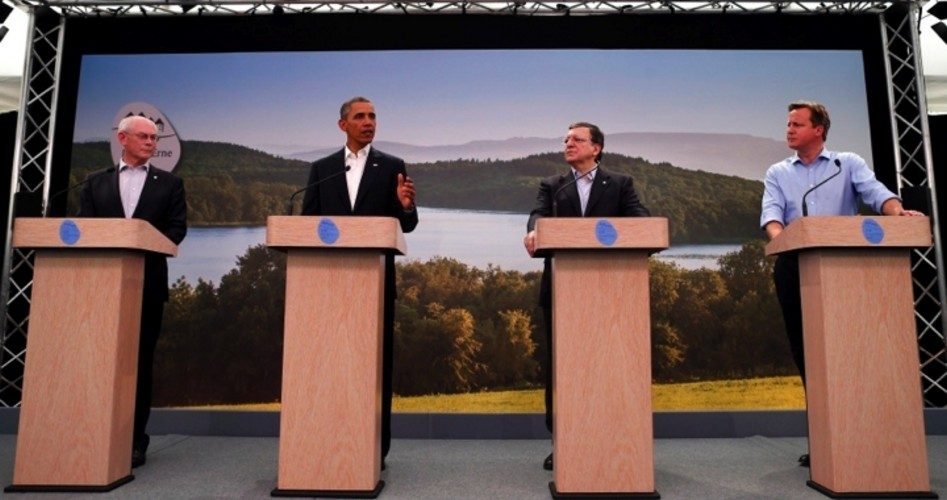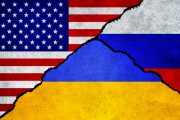
President Barack Obama, in Lough Erne, Northern Ireland, for the G8 Summit, joined European leaders in pushing the proposed Transatlantic Trade and Investment Partnership (TTIP), a vast scheme for intertwining the economies and political structures of Europe and the United States. (See our detailed exposé of the TTIP, “Secretly Trading Away Our Independence.”)
British Prime Minister David Cameron opened the press conference with promises that the new “trade partnership” would “fire up our economies and drive growth and prosperity around the world,” a common claim that has accompanied virtually every so-called trade agreement; but the reality has never matched the hype. Likewise for the assertion that it would produce millions of new jobs.
Prime Minister Cameron (see video below) proclaimed:
Welcome to Lough Erne. I always said that the whole point of this meeting in Lough Erne is to fire up our economies and drive growth and prosperity around the world — to do things that make a real difference to people’s lives. And there is no more powerful way to achieve that than by boosting trade.
And there’s no better way than by launching these negotiations on a landmark deal between the European Union and the United States of America — a deal that could add as much as a £100 billion to the EU economy, £80 billion to the U.S. economy, and as much as £85 billion to the rest of the world.
And we should be clear about what these numbers could really mean: two million extra jobs, more choice and lower prices in our shops. We’re talking about what could be the biggest bilateral trade deal in history; a deal that will have a greater impact than all the other trade deals on the table put together.
“We intend to move forward fast.” — Barroso
European Commission President José Manuel Barroso followed in a similar vein, announcing, “We intend to move forward fast”:
Today is a special day for the relation between the European Union and the United States. Today we announce we will start negotiations of a comprehensive Transatlantic Trade and Investment Partnership agreement.
Very frankly, two years ago, very few would have bet that today we’d be in the position to launch negotiations of an ambitious European Union-United States free trade agreement. And when the teams of the European Commission and United States will meet for the first round on the negotiations next month, it will be the start of a joint undertaking of real strategic importance….
We intend to move forward fast. We can say that neither of us will give up content for the sake of speed, but we intend to make rapid progress. I’d rather see the core challenge, moving our regulatory regimes closer, and addressing the harmful effect of behind-the-border trade barriers.
President Obama (see video below) told reporters:
I’m pleased to join these leaders to announce the launch of negotiations on a new trade agreement that will help us do just that — the Transatlantic Trade and Investment Partnership, also known as TTIP…. I can tell you that it has been warmly received in the United States as well, both in our Congress and in our business community. And that broad support, on both sides of the Atlantic, will help us work through some of the tough issues that have already been mentioned….
So this Transatlantic Trade and Investment Partnership is going to be a priority of mine and my administration. It is important that we get it right — and that means resisting the temptation to downsize our ambitions or avoid tough issues just for the sake of getting a deal.
Selling “Interdependence”
European Council President Herman Van Rompuy called the G8’s TTIP deal a “special moment” in which seeds are being planted today for the jobs of tomorrow. According to Van Rompuy:
This is a special moment. At the last EU-U.S. summit with President Obama, we jointly decided to see if launching such historic negotiations would be possible. It was. And now we can already start the talks. A year and a half ago, we were not even sure the place had a door, and now we are entering the negotiating room together….
We both know there are no magic solutions. Recent economic turbulence underlines this. But we cannot expect to harvest new jobs today; we can plant the seeds for the jobs of tomorrow. And that’s exactly what the trade agreement is about.
The positive ramifications will even go beyond the economy as such. We are making our economies all over the world more interdependent, and this will make the world safer.
Van Rompuy did not explain how the “interdependence” he praises will “make the world safer.” The series of financial “contagions” that have caused the near implosion of the world financial market can be traced to the interdependence of the national central banks, the European Central Bank, the IMF and the global policies that these entities have pursued. Interdependence has allowed national and regional malfeasance and malpractice to mushroom into global threats, which are then cited as justification for still more centralization, globalization, and “interdependence.”
It is clear that the interdependence the G8 summiteers are promoting involves the same deceptive processes that have already destroyed the sovereign independence of the former nation states of Europe, which now find themselves trapped in an ever more oppressive regime dictated by shadowy EU bureaucrats in Brussels. As with the European Union, the TTIP plan is all about “integration” — economic and political integration and “convergence.”
President Bill Clinton’s Secretary of State Warren Christopher gave a pretty strong hint of this in 1995, when he announced the “Transatlantic Agenda for the 21st Century,” stating: “The long term objective is the integration of the economies of North America and Europe, consistent with the principles of the WTO.” This, he averred, “will align our efforts to promote transatlantic integration with the forces of integration around the world.”
Andrew Reding of the World Policy Institute is an avid internationalist who has publicly admitted that the “trade” side of NAFTA masks the real nature of NAFTA and other trade pacts. “With economic integration will come political integration,” he has acknowledged. And he has admitted further: “By whatever name, this is an incipient form of international government.”
Under any form of international or world government, Americans, of course, would have none of the protections against tyranny afforded by our Constitution and Bill of Rights.
Photo of Van Rompuy, Obama, Barroso, and Cameron at G8: AP Images
Related articles:
Secretly Trading Away Our Independence
CFR Applauds European Union’s “Real Subversion of Sovereignty”

